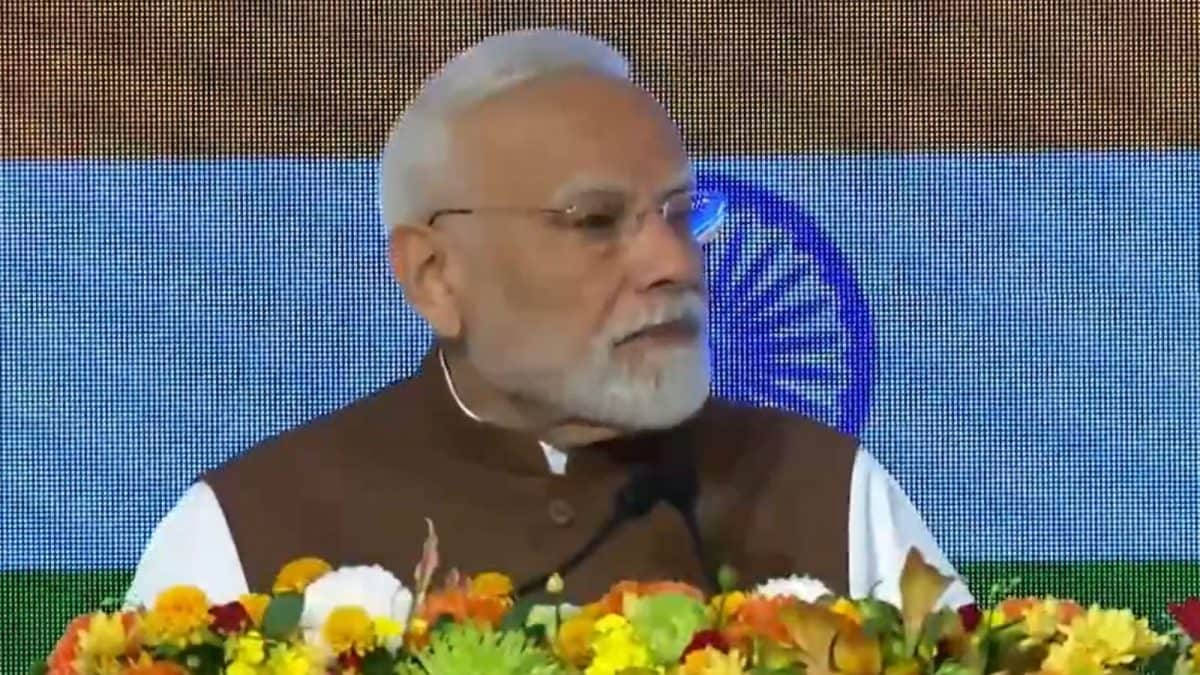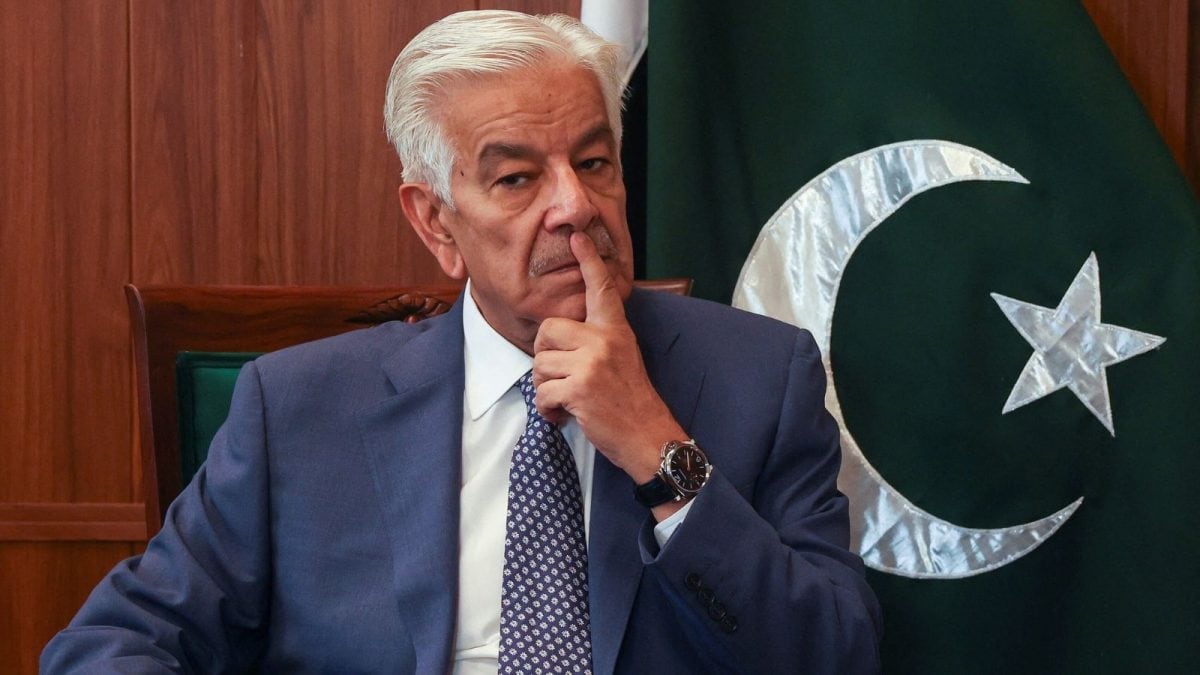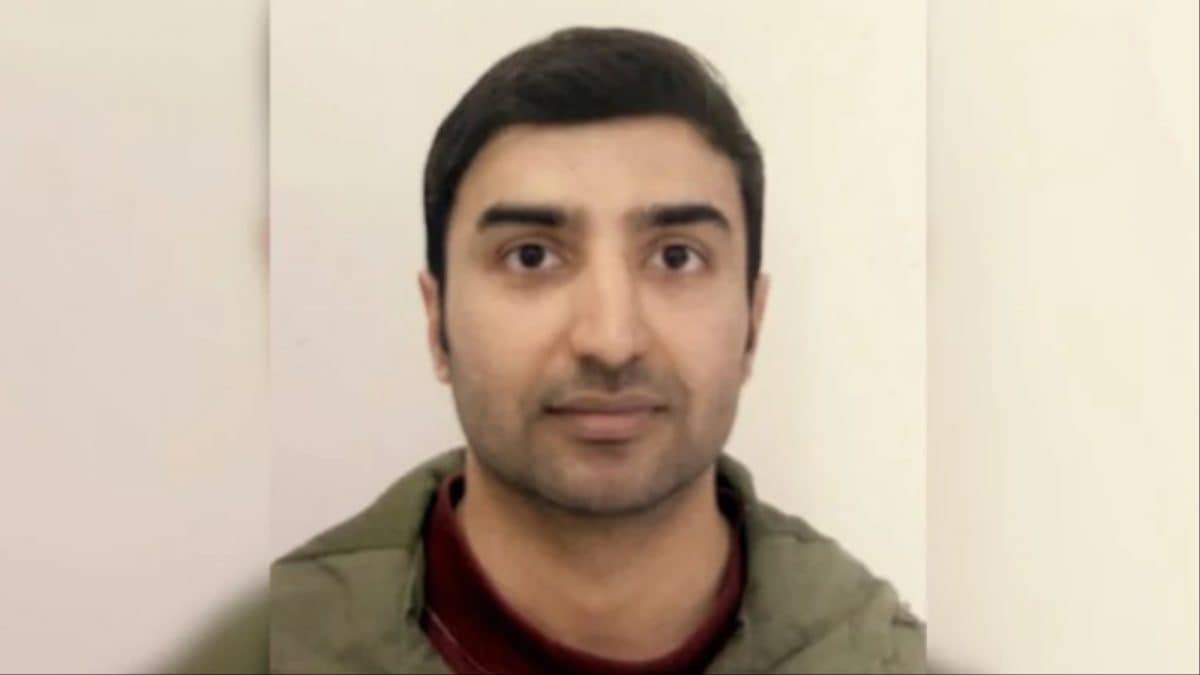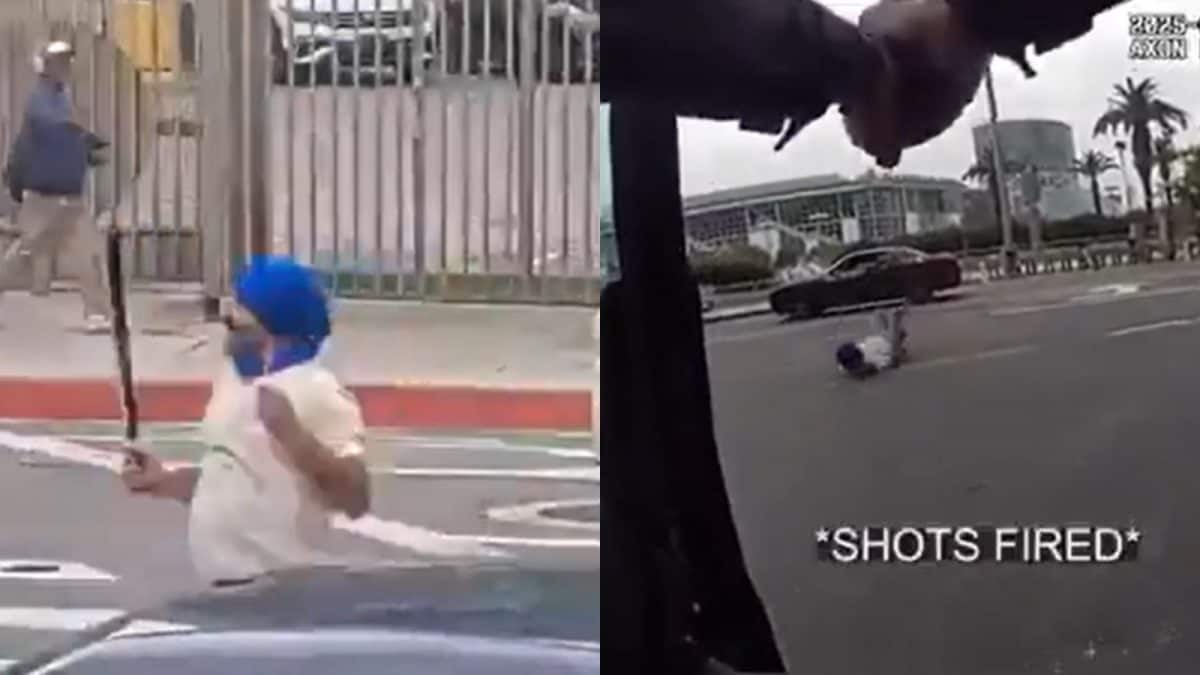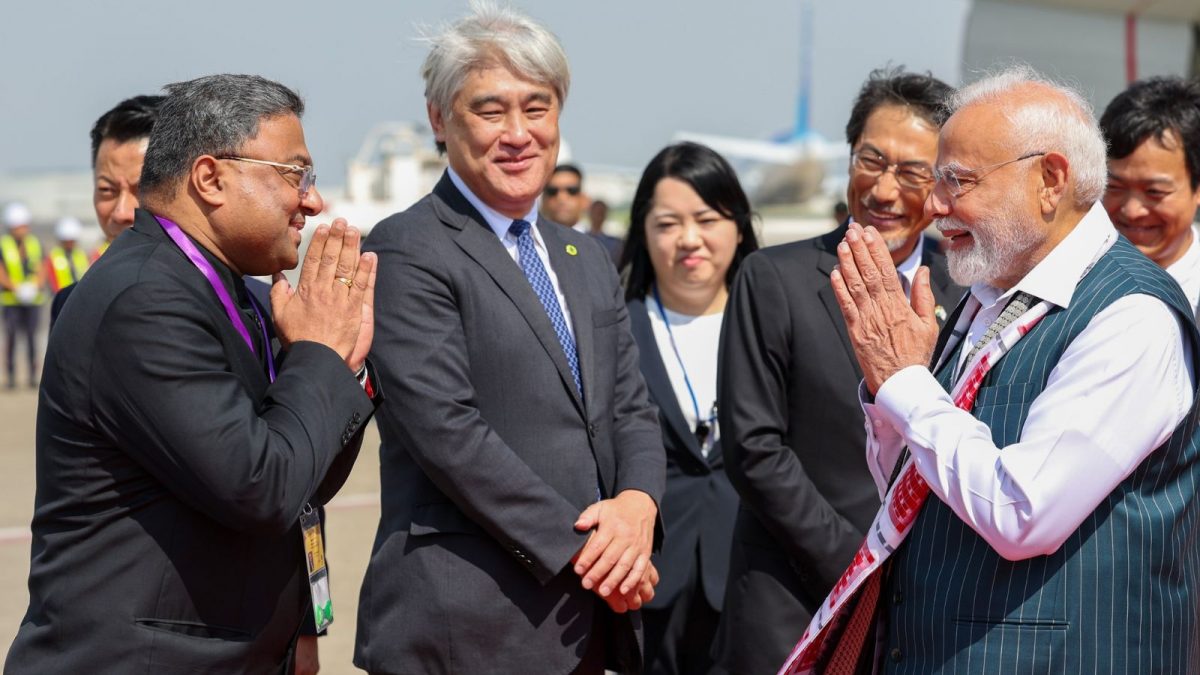Last Updated:August 29, 2025, 12:43 IST
Israel targeted a camera near Nasser Hospital. One shell hit, followed nine minutes later by two more at the same location, killing medics, journalists, and civilians on site

On August 25, a projectile struck the upper floors of the Nasser Medical Complex in Khan Younis, the last major functioning hospital in southern Gaza. (Reuters Image)
On Monday, August 25, a projectile struck the upper floors of the Nasser Medical Complex in Khan Younis, the last major functioning hospital in southern Gaza. The blast killed Reuters cameraman Hussam Al-Masri, who was operating a live camera feed from an exterior staircase frequently used by journalists to find signal.
Roughly nine minutes later, two more shells struck the same site, almost simultaneously. A frame-by-frame analysis of video footage obtained by CNN revealed that the second strike was, in fact, a second and third strike — two near-simultaneous explosions that hit the same stairwell, just moments apart. According to CNN, the munitions used were likely Israeli M339 multi-purpose tank shells, which produce both blast and fragmentation damage.
The two follow-up impacts killed at least 20 people, including five journalists: Al-Masri (Reuters), Mohammad Salama (Al Jazeera), Mariam Abu Dagga and Moath Abu Taha (freelancers who had contributed to Reuters and AP), and Ahmed Abu Aziz, a Palestinian freelance journalist.
What Is A ‘Double-Tap’ Strike And Why Is It So Controversial?
A “double-tap" strike is a two-stage attack: the first strike targets a suspected military objective, and the second — timed minutes later — hits the same site again, often when medics, journalists, or civilians have rushed in to help the injured. The term is not defined in international treaties, but the method is widely documented and controversial because it exploits predictable rescue efforts.
According to The Conversation, the tactic raises immediate concerns under the law of armed conflict’s principle of distinction, which requires armed forces to differentiate between combatants and civilians. Janina Dill, co-director of the Oxford Institute for Ethics, Law and Armed Conflict, told NBC News that double-tap strikes are “irreconcilable with the conduct of a professional, legally advised and trained military force," adding that the tactic is “morally condemned" for exploiting people’s instinct to help.
A Camera, A Staircase, And Two Shells: Israel’s Account Vs What Video Shows
In the immediate aftermath of the strike, the Israel Defense Forces (IDF) issued a general statement expressing regret for civilian harm but did not confirm whether Nasser Hospital had been directly targeted. Israeli Prime Minister Benjamin Netanyahu later called the incident a “tragic mishap," saying Israel “deeply regrets" the loss of life and “values the work of journalists, medical staff, and all civilians".
On Tuesday, the IDF stated that its forces had identified a camera positioned in the area of the hospital that was allegedly being used by Hamas to observe Israeli troop movements. The IDF said the camera was targeted to remove what it described as an operational threat.
According to CNN, a senior Israeli security official said the original authorisation was for a drone strike on the camera; however, tank shells were used instead. The first strike occurred at 10:08 a.m., followed nine minutes later by two more shells that hit the same stairwell, just seconds apart, while medics, journalists, and civil defence workers were attending to the wounded.
The IDF later said six individuals killed were “terrorists." Gaza health officials and Hamas rejected the claim and accused Israel of identifying some victims based on unrelated deaths elsewhere in Khan Younis that day. As of now, the IDF has not commented on the third projectile visible in footage.
A Pattern Of War? Where Else Have Double-Taps Been Used
This was not the first reported case of a double-tap strike. The Bureau of Investigative Journalism documented follow-up drone strikes by the United States in Pakistan, Yemen and Afghanistan between 2009 and 2012 that killed rescuers arriving after initial hits. According to the Daily Mail, missiles struck a British Council building and the EU mission in Kyiv just 20 seconds apart in early August, prompting European officials to accuse Russia of deliberately targeting diplomatic and educational spaces.
Terror groups like Al Qaeda and Boko Haram have also employed double-tap methods, often sending a second suicide bomber to kill those arriving after the first explosion.
In Israel’s case, a joint investigation by +972 Magazine and Local Call, cited by NBC, found that the double-tap approach had become “routine" during the current campaign in Gaza. One military source reportedly told the outlet: “If there’s a strike on a senior commander, another one will be carried out afterwards to ensure rescue efforts don’t take place."
What Law Says And Why This May Cross The Line
humanitarian law, also known as the law of armed conflict, imposes strict limitations on how military operations are conducted, particularly in areas where civilians are present. These laws are grounded in the Geneva Conventions, to which Israel is a signatory, and are intended to protect non-combatants, including medical personnel, journalists, and patients, even during active hostilities.
Under the Geneva Conventions, hospitals are protected spaces and may only lose that protection if they are being used to commit acts harmful to the enemy. Similarly, journalists are considered civilians and are explicitly protected unless they take direct part in hostilities.
A strike on a hospital, especially one that is operating and known to be housing medical staff, journalists, and patients, therefore triggers serious legal scrutiny. Even if a legitimate military target is present (such as an enemy surveillance device), the laws of war require that certain conditions still be met before an attack is lawful.
Four core principles govern the legality of such actions:
Distinction: Forces must distinguish at all times between combatants and civilians, and between military objectives and civilian infrastructure. A failure to make that distinction can render an attack unlawful.Proportionality: An attack is prohibited if the expected civilian harm would be excessive in relation to the anticipated military advantage. In the Nasser Hospital case, the presence of dozens of civilians raises difficult questions about whether this threshold was met.Necessity: Only those actions necessary to achieve a concrete military objective are permitted. The IDF has said the strike was aimed at dismantling a surveillance camera allegedly operated by Hamas. But legal experts have questioned whether that justified the use of tank shells in a known civilian zone, especially when less destructive alternatives (such as a drone) were reportedly available.Humanity: Combatants must avoid causing unnecessary suffering. This principle underpins all others and is meant to ensure that the means and methods of warfare are not unlimited.According to The Conversation, these same rules apply whether the conflict is considered international (between states) or non-international (between a state and a non-state actor).
The Rome Statute, which governs the Criminal Court, includes the deliberate targeting of hospitals and humanitarian personnel as war crimes in both conflict types. Reckless disregard, even without intent, can also be grounds for prosecution if commanders failed to take feasible precautions to verify targets or minimise civilian harm.
What Israel, The UN And The World Are Saying Now
UN Secretary-General António Guterres called the strike “deeply concerning" and demanded an independent investigation. The Committee to Protect Journalists (CPJ) described the war in Gaza as “the most dangerous conflict for journalists in recent history," with at least 273 journalists killed, according to Al Jazeera’s count.
Several humanitarian organisations, including Doctors Without Borders (MSF) and Medical Aid for Palestinians, have condemned the strike. Governments from Germany, Qatar, Kuwait, Saudi Arabia, Canada, and the UK have issued statements denouncing the attack.
In the US, President Donald Trump said he was “not happy" about the strike. His Middle East envoy Steve Witkoff, speaking to Fox News, suggested that a resolution to the Gaza conflict could come “before the end of the year," adding that Hamas was “signalling openness" to settlement talks.
Could This Lead To War Crimes Charges?
Whether the Nasser Hospital incident will result in prosecution remains unclear. Intent is often difficult to prove, but video evidence, eyewitness accounts and evolving official statements may become central to any legal assessment.
The Criminal Court has jurisdiction over Gaza. If the second and third strikes are deemed to have knowingly targeted protected persons, or to have been carried out with reckless disregard for civilian life, they may qualify as war crimes under the Rome Statute.

Karishma Jain, Chief Sub Editor at News18.com, writes and edits opinion pieces on a variety of subjects, including Indian politics and policy, culture and the arts, technology and social change. Follow her @kar...Read More
Karishma Jain, Chief Sub Editor at News18.com, writes and edits opinion pieces on a variety of subjects, including Indian politics and policy, culture and the arts, technology and social change. Follow her @kar...
Read More
August 29, 2025, 12:39 IST
News explainers What Is ‘Double Tap’ & Why Israel’s Use Of It At A Gaza Hospital Is Drawing Global Criticism?
Disclaimer: Comments reflect users’ views, not News18’s. Please keep discussions respectful and constructive. Abusive, defamatory, or illegal comments will be removed. News18 may disable any comment at its discretion. By posting, you agree to our Terms of Use and Privacy Policy.
Read More

 4 hours ago
4 hours ago

